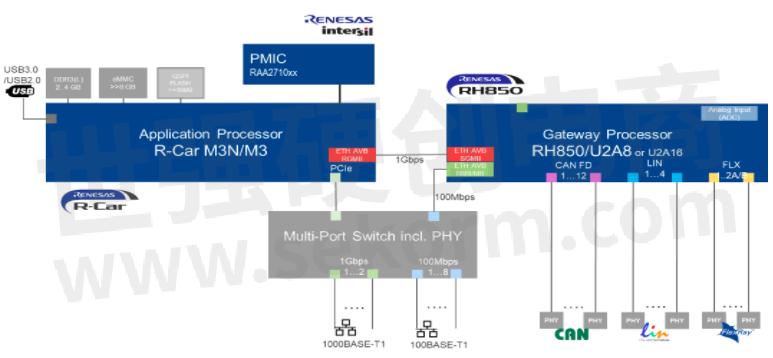Pairing An R-Car SoC Microprocessor with RH850 and PMIC, System Solution for CoGW ECUs Can Be Realized

Did you know that Renesas is the market-leading chip maker in the new Automotive Car Server/Communication Gateway (CoGW) market segment? To set the background – a combination of regulatory and market factors is forcing dramatic change today – from conventional cars with combustion engines toward electrified, autonomous, connected cars. In tandem, new business models are emerging that apply pressure to enable new vehicle features, subscription services, entertainment apps, and car-sharing services over the entire lifetime of a vehicle. The days are numbered for production of cars with features and capabilities that are static.
The vision of car makers today is a vehicle that is more of a smartphone on wheels than conventional automobile. Among the challenges on the road toward realizing this vision are the exponential growth in data-bandwidth requirements, and complete re-thinking of the way that software is architected and deployed. The number and capability of vehicle features can increase with the availability of more data, but software size also increases in accordance with increased feature content. Management and scaling of the increasing volume of software requires the conversion to a service-oriented-architecture (SOA) style of software design, and up-integration of software features to more powerful, centralized electronic control units (ECUs). SOA enables the fast-paced development and deployment of software in the world of mobile computing. Centralization of vehicle software enables new software-development and software-ownership models. In addition, as vehicles take increasing control of their own motion and integrate more deeply into our lives, as smartphones have done, advanced functional safety and enhanced security features are needed to enable secure, over-the-air transfers of data and software updates between connected cars and Cloud services.

While these trends are driving toward the goals of agile development and faster feature deployment, the gears of the Automotive industry are still spinning up, and preparatory work has been ongoing for years to push the necessary fundamental changes in technology to the market. In fact, the R&D for a Communication Gateway/Car Server ECU platform has been underway for more than 4 years at our market-leading customer, who were pioneers in this innovative, new market segment. At the time, they chose the chip supplier with highest device quality, high functional-safety capabilities, best-in-class ratio of computing performance to power consumption, and high commitment to the Automotive market. It should come as no surprise that the choice was Renesas.
The first volume production using this new Electrical/Electronic (E/E) architecture began at the end of 2019 with an electric vehicle (EV) line. The automaker’s plan is to expand the use of this E/E architecture platform to every other vehicle line over the next few years. To provide a sense of scale, an eight-digit yearly run rate is expected in full mass production by this company alone. We are proud to have contributed to this innovative Body High Performance Computer project. Other automakers will follow, introducing similar, new E/E architectures over the coming years, and we will continue to facilitate the rapid growth of this market segment.
Our dedicated, system solution for CoGW ECUs can be realized by pairing an R-Car system-on-a-chip (SoC) microprocessor with an RH850 microcontroller (MCU) and various analog chips such as the Power Management Integrated Circuit (PMIC).

For new projects, customers that already use similar Renesas SoC and MCU devices in various, legacy IVI/Cockpit and Body-application ECU platforms can enjoy a high level of software and hardware re-use. This is a great benefit, as software has a major impact on development cost and Time to Market (TTM).
Even new customers or R&D groups can benefit from the strong software ecosystem for R-Car and RH850 devices and begin rapid prototyping or proof-of-concept evaluation: Renesas is the first chip maker to provide a comprehensive reference design for the Connected Gateway/Car Server application, complete with the CETITEC communication software stack. This evaluation platform, called “Vehicle Computer 2,” has been developed in cooperation with our eco-system partner CETITEC. It is based on a complete Renesas chipset, covering the Connected Gateway/Car Server application up to a performance level of 40k DMIPS. The box can be used for evaluation, rapid prototyping, or data logging, and offers specific support for automotive requirements and communication standards such as CAN(FD), LIN, MOST, FlexRay, PCIe, and Ethernet. Various IEEE802.1/IEEE802.3 Ethernet TSN protocols are supported to realize high-bandwidth, real-time communication. For more details on the box and it’s features, please refer to this video.
Please visit our website for more technical detail about the Renesas multi-protocol gateway solution for all major Automotive communication interfaces, including Ethernet TSN. Related R-Car SoC and RH850 MCU documentation can be found there as well.
- +1 Like
- Add to Favorites
Recommend
This document is provided by Sekorm Platform for VIP exclusive service. The copyright is owned by Sekorm. Without authorization, any medias, websites or individual are not allowed to reprint. When authorizing the reprint, the link of www.sekorm.com must be indicated.


























































































































































































































































































































































































































































































































































































































































































































































































































































































































